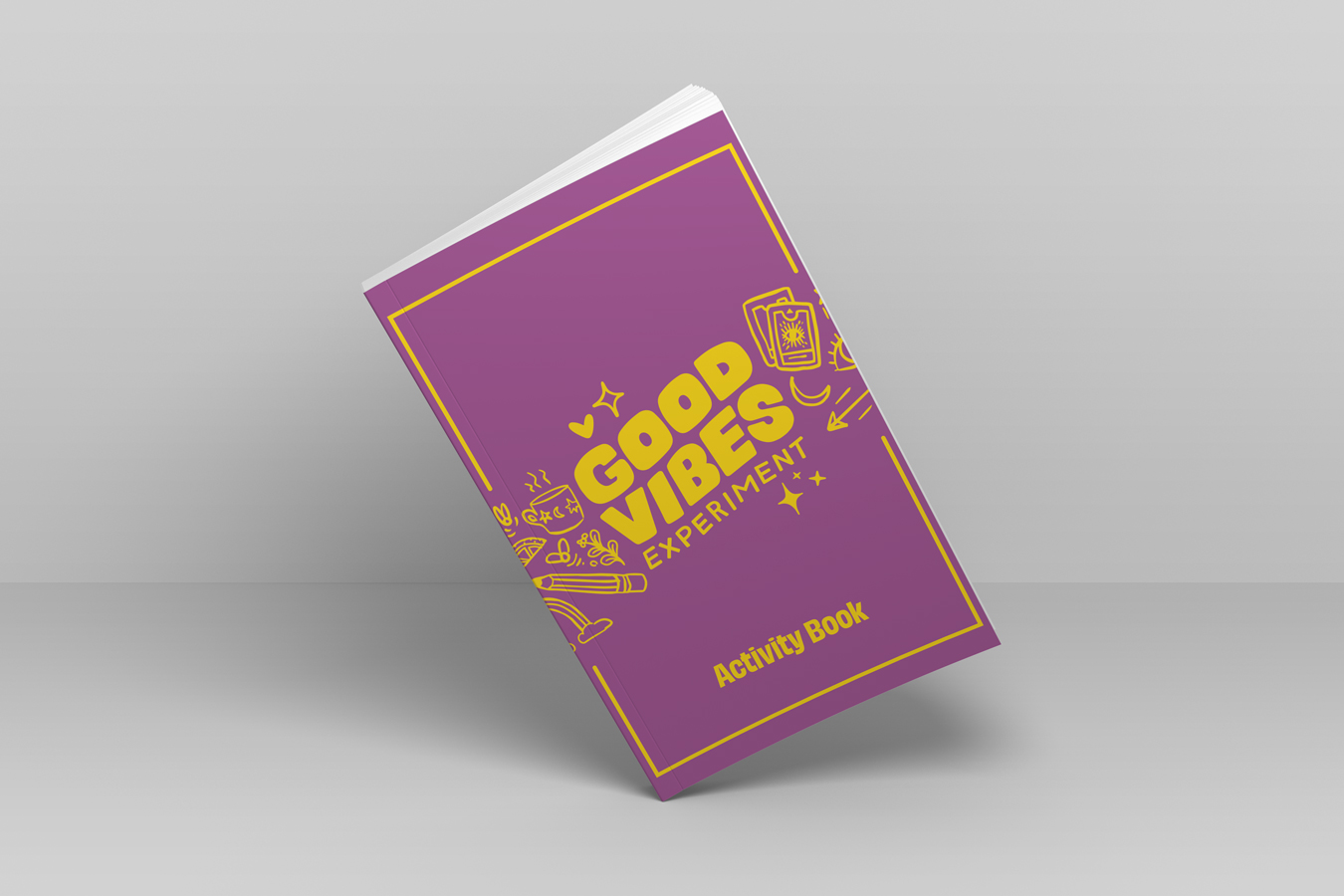
Overview: The Good Vibes Experiment is a mental health focused campaign running here at Flinders. The campaign which revolves around a freely distributed activity book, encourages people to experiment with adding evidence-based wellbeing activities into their everyday life. This post provides access to the various references which are included in the activity book. It is good for those who might want to do some more reading into the areas described in the book. Reading time ~ 5 minutes.
The Good Vibes Experiment campaign launched here at Flinders on the 17th March 2021. The campaign is continuing throughout 2022.
A core component of the campaign is the Activity Book 📖 which turns 20 evidence-based wellbeing tactics into 40+ fun but sometimes thought-provoking mental health themed activities.
We’re super keen for you to get your hands on one. In fact, if you are reading this post, there is a good chance you already have one, but if not:
a) look for hard copies floating around the campus
b) you can order one to get posted out to you – https://qualtrics.flinders.edu.au/jfe/form/SV_cwKtWWsQVWEbTFk
In the Activity Book, we share a few interesting facts we got from various different sources/references.
Here you will find links to those numbered references, in case you wanted to explore further.
1. Cho, H., Ryu, S., Noh, J., & Lee, J. (2016). The Effectiveness of Daily Mindful Breathing Practices on Test Anxiety of Students. PLOS ONE, 11(10), e0164822. https://doi.org/10.1371/journal.pone.0164822
2. Chase, J. A., Houmanfar, R., Hayes, S. C., Ward, T. A., Vilardaga, J. P., & Follette, V. (2013). Values are not just goals: Online ACT-based values training adds to goal setting in improving undergraduate college student performance. Journal of Contextual Behavioral Science, 2(3–4), 79–84. https://doi.org/10.1016/j.jcbs.2013.08.002
3. Tseng, J., & Poppenk, J. (2020). Brain meta-state transitions demarcate thoughts across task contexts exposing the mental noise of trait neuroticism. Nature Communications, 11(1), 3480. https://doi.org/10.1038/s41467-020-17255-9 – (editors note: this sounds super complex, but it is a study that is exploring how to use imaging techniques to document thoughts)
5. Dahl, C. J., Wilson-Mendenhall, C. D., & Davidson, R. J. (2020). The plasticity of well-being: A training-based framework for the cultivation of human flourishing. Proceedings of the National Academy of Sciences, 117(51), 32197–32206. https://doi.org/10.1073/pnas.2014859117
6. https://greatergood.berkeley.edu/article/item/is_gratitude_good_for_your_health
7. https://blogs.flinders.edu.au/student-health-and-well-being/2018/09/25/many-hours-take-make-friend/
8. https://www.bbc.com/news/magazine-26384712
10. Piff, P. K., Dietze, P., Feinberg, M., Stancato, D. M., & Keltner, D. (2015). Awe, the small self, and prosocial behavior. Journal of Personality and Social Psychology, 108(6), 883–899. https://doi.org/10.1037/pspi0000018
11. Hensley, L. C., & Munn, K. J. (2020). The power of writing about procrastination: journaling as a tool for change. Journal of Further and Higher Education, 44(10), 1450–1465. https://doi.org/10.1080/0309877X.2019.1702154
12. https://www.aihw.gov.au/reports/australias-welfare/social-isolation-and-loneliness

13. Ma, X., Yue, Z.-Q., Gong, Z.-Q., Zhang, H., Duan, N.-Y., Shi, Y.-T., Wei, G.-X., & Li, Y.-F. (2017). The Effect of Diaphragmatic Breathing on Attention, Negative Affect and Stress in Healthy Adults. Frontiers in Psychology, 8. https://doi.org/10.3389/fpsyg.2017.00874
15. https://www.beyondblue.org.au/docs/default-source/senseability/humour-facts.pdf?sfvrsn=2
16. Hutcherson, C. A., Seppala, E. M., & Gross, J. J. (2008). Loving-kindness meditation increases social connectedness. Emotion, 8(5), 720–724. https://doi.org/10.1037/a0013237
17. https://digest.bps.org.uk/2008/07/23/novelty-seekers-are-biased-to-the-right/
18. Mantzios, M., Skillett, K., & Egan, H. (2019). Examining the Effects of Two Mindful Eating Exercises on Chocolate Consumption. European Journal of Health Psychology, 26(4), 120–128.
19. Zhao, X., & Epley, N. (2020). Kind words do not become tired words: Undervaluing the positive impact of frequent compliments. Self and Identity, 1–22. https://doi.org/10.1080/15298868.2020.1761438
20. Megahed, N. A. (2017). Origami Folding and its Potential for Architecture Students. The Design Journal, 20(2), 279–297. https://doi.org/10.1080/14606925.2017.1270511
22. Elk, M., Arciniegas Gomez, M. A., Zwaag, W., Schie, H. T., & Sauter, D. (2019). The neural correlates of the awe experience: Reduced default mode network activity during feelings of awe. Human Brain Mapping, hbm.24616. https://doi.org/10.1002/hbm.24616
23. https://fs.blog/mental-models/
24. Lunenburg, F. C. (2011). Goal-setting theory of motivation. International journal of management, business, and administration, 15(1), 1-6.
25. Givi, J., & Galak, J. (2020). Selfish Prosocial Behavior: Gift-Giving to Feel Unique. Journal of the Association for Consumer Research, 5(1), 34–43. https://doi.org/10.1086/706507
26. https://www.learningscientists.org/downloadable-materials
27. https://jamesclear.com/new-habit
28. Pretorius, C., Chambers, D., & Coyle, D. (2019). Young People’s Online Help-Seeking and Mental Health Difficulties: Systematic Narrative Review. Journal of Medical Internet Research, 21(11), e13873.
29. https://self-compassion.org/wp-content/uploads/2016/12/Self-Criticism.pdf
30. Kramarczyk, J., & Alemany Oliver, M. (2020). Accumulative vs. Appreciative Expressions of Materialism: Revising Materialism in Light of Polish Simplifiers and New Materialism. Journal of Business Ethics. https://doi.org/10.1007/s10551-020-04628-9
31. Schouten, K. A., de Niet, G. J., Knipscheer, J. W., Kleber, R. J., & Hutschemaekers, G. J. M. (2015). The Effectiveness of Art Therapy in the Treatment of Traumatized Adults. Trauma, Violence, & Abuse, 16(2), 220–228. https://doi.org/10.1177/1524838014555032
32. https://drdavidhamilton.com/category/oxytocin/
33. https://jamesclear.com/atomic-habits
34. Delgado, C., Toukonen, M., & Wheeler, C. (2018). Effect of Canine Play Interventions as a Stress Reduction Strategy in College Students. Nurse Educator, 43(3), 149–153. https://doi.org/10.1097/NNE.0000000000000451
35. Thalluri, Jyothi; O’Flaherty, Jackie A.; and Shepherd, Paul L., Classmate peer-coaching: “A Study Buddy Support scheme”, Journal of Peer Learning, 7, 2014, 92-104. Available at: https://ro.uow.edu.au/ajpl/vol7/iss1/8
36. https://www.secretlifeofpronouns.com/
37. https://www.sciencedaily.com/releases/2009/06/090603103807.htm

